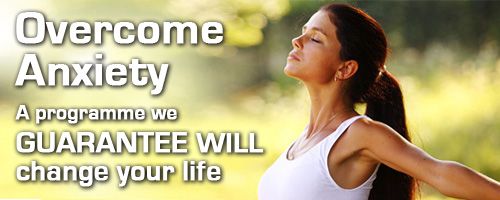What is anxiety?
Anxiety is a natural response to a stressful situation. All of us feel anxiety occasionally (to a greater or lesser extent). Anxiety though can be a blessing or a curse, it has the ability to equip us to perform to our optimum level, or to create immense fear within us. Some of us have the ability to harness and use these instinctive reactions to our advantage, while for others it controls and restricts lives.
When anxiety becomes a problem
Symptoms of anxiety can take over a person’s life, and day to day living can become a quest to avoid that which makes us anxious. Below we look at the different symptoms anxiety can give us, however on our Anxiety Disorders page we see that there are different types of anxiety disorder, each with varying characteristics. Here we focus merely on the psychological and physical symptoms of the ‘fight or flight response’ triggered by anxiety.
The 'Flight or Fight' response
When our bodies feel danger (this maybe real or perceived) chemicals kick in to prepare us to face or flee the danger. This is an instinctive reaction and it is known as the ‘fight or flight’ response. If there is no need to use the excess chemicals or the increased oxygen supply, then our bodies begin to act against us, the decreased carbon dioxide levels in our lungs and blood causes us to feel dizzy and disoriented, we can begin to hyperventilate and panic.
Anxiety can be specific or general. This means it can occur in response to a stressful event (specific) or be present all the time (general). Please see our page on Anxiety Disorders for more about specific conditions.
Symptoms of anxiety
Anxiety symptoms will differ and vary in intensity from person to person. Each time we feel anxious may be slightly different even within the same individual. It is a great idea to keep a diary of your symptoms, as this will give you the best picture of how your own body deals with anxiety. This will help demystify an anxiety episode and help you understand how you best cope with your own symptoms. It will also remind you that you have survived anxiety attacks before.

Anxiety itself can cause psychological and behavioural symptoms such as:
- Intense fear
- Fear you are ‘going mad’
- Restlessness, fidgeting, inability to concentrate
- Sense of impending danger
- Nervousness feeling ‘on edge’
- Impatience
- Irritability
- Being easily distracted
- Sleep difficulties – Insomnia
- Detachment from surroundings
Anxiety can also cause physical symptoms including:
- Rapid heartbeat
- Irregular heartbeat (palpitations)
- Shortness of breath
- Shallow breathing
- Dizziness
- Stomach discomfort/pain/nausea
- Diarrhoea/ increased bowel movements
- Drowsiness and tiredness
- Hypersensitivity (sights/sounds appear different perhaps louder/intensified)
- Pins and needles
- Tense aching muscles especially in the shoulders/chest and/or abdomen
- Dry mouth
- Sweating (which may have a different smell)
- Headache
- Excessive thirst
- Frequent urinating
- Irregular periods (painful/missed)
- Insomnia – sleep difficulties
- Shaking
- Difficulty Swallowing
These symptoms could indicate an anxiety disorder or another medical condition; these should always be discussed with your GP.
Anxiety can cause longer-term symptoms and changes in behaviour, these can include:
- Withdrawing from social activities,
- Avoiding social events, friends and family, even work
- It is not uncommon for anxiety sufferers to take up smoking, drinking or taking drugs
- Anxiety sufferers can find that in order to try and gain perceived control over their lives they increasingly avoid situations that make them anxious, this can lead to increased isolation and anxiety.
Dealing with anxiety
Firstly, remember Panic Attacks – Anxiety Attacks will not kill you. Although it feels incredibly physical and life threatening, it is not. We have put together some excellent ways of helping you deal with anxiety on our No More Panic page. Please also see below for further information on anxiety.
Anxiety, further help
We hope you have found this information useful, please also see
What Is Anxiety
Fight or Flight
Anxiety Symptoms
Anxiety Disorders
Coping with Anxiety
Generalised Anxiety Disorder
Panic Attacks
No More Panic
Anxiety Treatment
Anxiety Management
Managing Stress
Anxiety and Debt
Social Anxiety
Anxiety as a Result of Domestic Abuse
Work Related Stress
Anxiety and Substance Abuse





